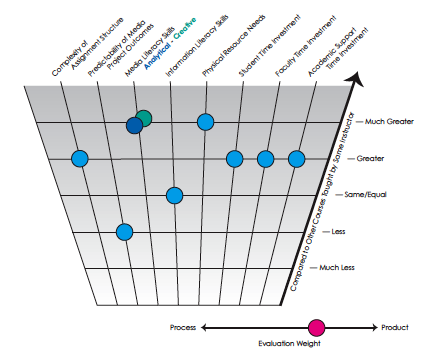Case Study: Comparative Politics
GOVT 112. Professor Sharon Rivera, Hamilton College
Please provide the course description as it appears in the catalog and the typical enrollment for the course.
Introduction to the study of non-American national political systems, emphasizing authority, legitimacy and processes of state- and nation-building. Comparison of alternate forms of political development in selected Western and non-Western countries. Prerequisite, (Proseminar and writing-intensive in the fall.). Open to junior and senior non-majors with consent of instructor only. Enrollment: 32 (16 per section)
What are the learning goals of the media assignment(s) in the course. If your course assignments contain both analysis and creative production components, describe the learning goals of each.
My Role in the Course: One of my goals for this course is to help students develop their critical thinking skills and analytical abilities. I believe that my job is to cover important factual information on a topic and to highlight crucial arguments concerning that issue. I then want to help you evaluate the merits of competing sides of the debate and draw your own conclusions about the subject matter. It is my hope that at the end of the semester, you will not only have mastered the relevant theories, current controversies, and public policy debates in comparative politics, but will have also formed your own reasoned, well-founded opinions about the subjects discussed in class. To that end, I will strive to pose provocative questions, challenge your thinking, and encourage discussion and debate.
In addition, I believe that students have different learning styles: some learn well via traditional lectures while others perform better in hands-on situations. Accordingly, I have designed a range of activities and teaching formats to help you to find your niche in the classroom. I hope, however, that you will try to improve on your weaknesses this semester. If you are not comfortable in public speaking situations, I would like you to try to learn to speak up in class occasionally. If writing is not your strength, I would encourage you to try to improve your writing skills over the semester. Please feel free to consult with me about your personal academic goals for this course.
What are the relationships of the media assignment(s) to the other aspects of the course?
Over the course of the semester, students will have the opportunity to participate in a simulation of an election campaign and the formation of a coalition government in a fictitious European country. The simulation is designed to help you internalize what we have learned regarding party systems, electoral rules, parliamentary government, and coalition formation. Students will be required to work cooperatively in groups to draft a party platform, design campaign materials and ads, prepare for a public debate, and form a coalition government after the election. Many of the activities will have practical relevance to life beyond the Hill and you are encouraged to use this experience to try out the world of politics for yourself. In order to prevent "free-riding," each group will assess the participation level and effort of all of its members at the end of the term. Simulation grades will be based upon these assessments, individual work submitted during the simulation, and overall group performance.
Describe your assignment design/structure.
The simulation is designed such that you, working in groups, will develop party platforms, create campaign materials and a campaign video, field candidates for an election, hold a public debate, and ultimately, form a coalition government. Each person will be randomly assigned to a party group but will be able to select the role (party leader, party secretary, press secretary, policy expert) within the party that he or she would like to play. Each of the four roles has its own specific requirements and responsibilities. Some work will be completed during class time but most will be done outside of class. You are required to have weekly group meetings.
In addition, all group members are required to submit written reports to the group's Blackboard space when they have completed a task or attended a meeting related to the simulation. The press secretary will then use these submissions to create a group weekly report.
To what extent does your assignment design address issues of visual/aural literacy?
We have in-class training sessions on visual literacy (two--one on moving images and one on still imagery) and then we deconstruct the students' work in class.
To what extent does your assignment design address issues of information literacy?
We have out-of-class training sessions on research strategies, and the course covers substantive material that must be incorporated into the finished media products.
To what extent does your assignment design address issues of technology skills?
We have out-of-class training sessions on camera use, video editing, and Photoshop techniques.
What are the resources necessary for your assignment (content/materials, institutional support, equipment)?
ITS staff to help with logo creation and video production. Cameras, mikes, video editing software, Photoshop.
Describe how you evaluated the project outcomes? Did you evaluate process? Outcomes? Both?
Students are evaluated on the basis of the end product by me and by external reviewers. They are also evaluated on the processes of group collaboration via a peer review survey that I administer at the end of the term.
Estimate the time invested in the project by you, your students, and academic support staff.
Lots!!!! Countless hours in set-up for me; many hours by academic support staff; extra out-of-class hours by the students.
How many times have you taught this course/assignment? What would you do differently next time?
5.
What is your level of expertise with respect to media technologies and scholarship?
General awareness. Some hands-on experience.
An instructor created model, instructor comments and students projects can be found here.
